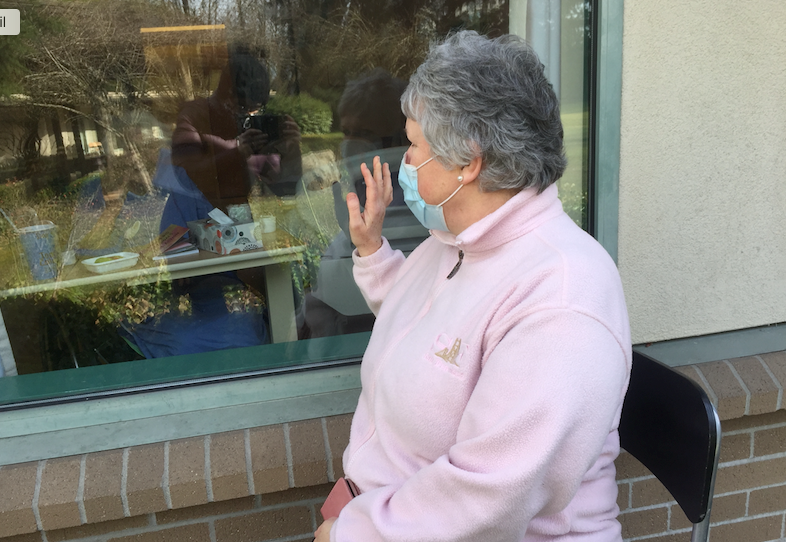Even through a window, you can see that retired Coquitlam kindergarten teacher Joan Caldwell is a woman who continues to be meticulous about her appearance and belongings.
Currently, isolated in her room at Eagle Ridge Manor due to the Port Moody facility’s COVID-19 protocols, Caldwell arranges her box of tissues, goal-setting book, photos and snacks.
Outside her daughter, Sue Dupuis, sits in a chair she brought from home, and waves and calls to her mom.
It’s a sad picture replayed at dozens of Tri-City care homes since the pandemic started last year.
But for Dupuis, who is also a retired Coquitlam teacher, her mother’s isolation is difficult to understand because her 90-year-old mother has had two doses of COVID-19 vaccine — and she recently tested negative from the virus.
“This is the quickest way to kill people,” Dupuis said as she moved her chair, which is crammed beside the building wall that’s covered in ivy.
For the past four days, Dupuis has spent several hours outside in front of her mother’s window trying to keep up her mom’s spirits.
Told she can’t be her mom’s designated visitor — even though her mom has dementia and mobility issues because of a broken ankle — Dupuis feels helpless because she can’t do all the tasks she would normally do to make sure her mother doesn’t spiral into illness and despair.
“It’s just not OK. She’s being denied things that would give her a better life,” said Dupuis.
The ordeal started when Caldwell, who was living with Dupuis, broke her ankle and was taken to Eagle Ridge Hospital where she convalesced for a month. At the Port Moody hospital, Dupuis was allowed to provide daily comfort and care for her mom as a designated family member; she also made sure her mom ate her meals.
Dupuis said while at ERH she observed all COVID-19 mask, santizing and physical distancing protocols, and would do so again, including regular temperature and testing.
But when Caldwell was relocated to nearby Eagle Ridge Manor, she was put into isolation for 14 days, and Dupuis was told she couldn’t continue to visit.
Whether she would be able to go in after 14 days wasn’t made clear, said Dupuis, who was told over the phone she couldn’t go in to see her mom.
Now she’s writing a letter to appeal that decision.
According to B.C.’s health ministry, essential visits are those that are required when care can’t otherwise be met in a facility; it’s also up to facility staff to determine if a visit is essential.
Dupuis said she is able to provide care that could supplement Eagle Ridge Manor care, including help getting her mother to the toilet, ensuring she drinks her nutritional supplement that Dupuis brings every day, and helping with exercise and mental stimulation.
According to Dupuis, she visits her mom a couple of times a day and often sees no one in the room. And while she’s awaiting the results of appealed to the Manor management, Dupuis wrote a letter for the media — and the manor — that sums up her concerns:
“I do not want my mother to experience ‘failure to thrive’ but I can see it in only two days. She cries, wants to go home, asks me to come in, tells me she needs me, and more. I can not sit by and idly watch my elderly mother lose her spirit or will to live. My time with her is so precious and I do not have much more time left with her. She is operating with 40% heart function and has lost a lot of weight. Mentally she is working at an age two level. Soon, she will not know me. It is heartbreaking.”
The Tri-City News has reached out to Fraser Health to find out why Dupuis has been denied essential visitor status but has yet to get an answer back.




